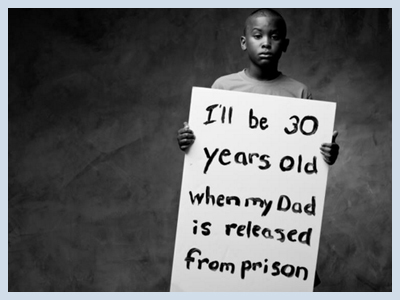Without support and services, children of incarcerated parents are themselves at risk of juvenile and adult criminal justice involvement.
- Children whose parents are incarcerated and who do not receive any services to help them deal with this experience are 5-6 times more likely than their peers to become involved in the criminal justice system.
- Various studies suggest that 50% of juveniles in the juvenile and adult criminal justice systems have a close relative in prison.
- There are currently close to 10 million children in the United States whose parents are or have once been under criminal justice supervision (arrested, incarcerated, or on probation or parole).
Children in foster care are also at increased risk of juvenile and adult criminal justice involvement.
- In New York City, 51% of the youth in detention have had prior ACS contact (1999).
- In New York City, 16% of youth in detention have an open foster care bed (1999).
- One study found that 1 in five adult women offenders had spent time in foster care (1990).
Children in foster care who have an incarcerated parent belong to both of the above groups- with your help they can overcome the odds that they, too, will enter the juvenile and criminal justice systems. How can YOU help break this cycle?
- Establish contact with the child’s parent immediately and begin to address the child’s need for contact, information about what is happening to them and to their parent, and permanency. In addition to being an important person in the child’s life, the parent can be a source of important information about the child’s health, background, and his/ her family.
- Arrange for contact between the child and parent as soon as possible (and when in the child’s best interest), and ensure that this contact is regular and consistent. Contact can mean visits, phone calls and/ or letters.
- Discuss the Adoption and Safe Families Act (ASFA) with parents so they understand the time-frames within which they– and you– have to work. If reunification is in the child’s best interest and possible, you can comply with ASFA by documenting a “compelling reason” (one of ASFA’s 3 allowable exceptions) why filing for termination of the parent’s rights (TPR) is not in the child’s best interest.
- If the parent is not a possible discharge resource, speak with and involve them in planning for their children’s future, including discussing conditional surrenders, custody, and other permanency options for their children. Ask them to help you identify potential family resources who can provide a family for their children, including supporting their ongoing relationship with their children.
Resources to Assist You in Navigating the Criminal Justice System and Supporting Young People whose Parents are Incarcerated
- The ACS Children of Incarcerated Parents Programprovides free transportation for visits and casework contacts to parents and youth who are incarcerated in the tri-State area. They also provide support and assistance re: locating and communicating with parents, setting up visits, and permanency planning when incarceration is involved: (212) 487-8630.
- The Osborne Association’s Family Works Program and Resource Center provides visiting support and facilitation and general assistance of many kinds regarding families affected by incarceration. Osborne also offers a mentoring program for youth. Families do not need to be involved with child welfare to access their free-of-charge services: (718) 637-6560.
- Incarcerated Mothers Program (IMP), located in East Harlem, provides therapeutic support to children and young people whose mother is incarcerated, as well as support for caregivers and incarcerated mothers. IMP also has a mentoring program: (212) 410-4200.
- The Women’s Prison Association (WPA) provides an array of services to incarcerated women as well as re-entry support, programs, and housing. WPA’s Huntington House is a transitional housing program located on the lower east side of Manhattan for mothers and their children in the process of reunifying: (212) 674-1163.
- Hour Children provides visits and support for children and their incarcerated mothers, as well as parenting and programs “inside,” and housing upon release for mothers with young children. Hour Children offers caregivers and housing (as an alternative-to-foster care) for young people whose mother is incarcerated: (718) 433-4724.
- Prison Families of New York, Inc. provides service referrals, technical assistance, and training. Located in Albany, NY: 518-453-6659. The Director, Alison Coleman, can be reached at: alison.coleman@rcda.org. See www.prisonfamiliesofnewyork.org for more information.
Source: Barry Chaffkin & Tanya Krupat, Coalition 2007 Conference Presentation

